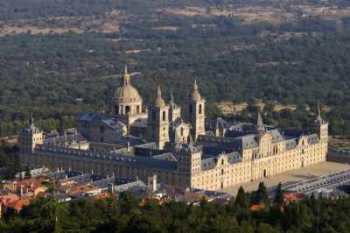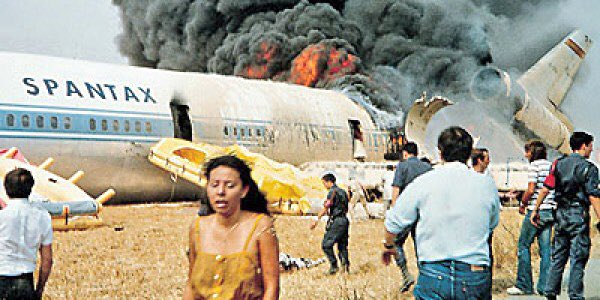September 13
Saints Days: Juan Crisóstomo, Amado, Felipe, Eulogio and Julián Ligorio
1504 - Ferdinand and Isabella in Spain issued a royal decree ordering the erection of the Royal Chapel (Capilla Real) of Granada.

San Lorenzo del Escorial Palace - photo en.wikipedia.org
1584 – San Lorenzo del Escorial Palace in Madrid is finished.
On 16 June 1779, Spain entered the war on the side of France and as co-belligerents of the rebellious American colonies—the British base at Gibraltar was Spain's primary war aim. The vulnerable Gibraltar garrison under George Augustus Eliot was blockaded from June 1779 to February 1783, initially by the Spanish alone, led by Martín Álvarez de Sotomayor. The blockade proved to be a failure because two relief convoys entered unmolested—the first under Admiral George Rodney in 1780 and the second under Admiral George Darby in 1781—despite the presence of the Spanish fleets. The same year, a major assault was planned by the Spanish, but the Gibraltar garrison sortied in November and destroyed much of the forward batteries.
The Spanish having consistently failed to either defeat the garrison or prevent the arrival of relief efforts, the besiegers were reinforced by French forces under de Crillon, who took over command in early 1782. After a lull in the siege, during which the Franco-Spanish besiegers gathered more guns, ships and troops, a "Grand Assault" was launched on 18 September 1782. This involved huge numbers—60,000 men, 49 ships of the line and 10 specially designed, newly invented floating batteries—against the 5,000 defenders. The assault proved to be a disastrous and humiliating failure, resulting in heavy losses for the Bourbon attackers. This was the largest action fought during the war in terms of numbers.
The final sign of defeat for the allies came when a crucial British relief convoy under Admiral Richard Howe slipped through the blockading fleet and arrived at the garrison in October 1782. The siege was finally lifted on 7 February 1783 and resulted in a decisive victory for the British. The siege was a factor in ending the American Revolutionary War. The Peace of Paris negotiations were reliant on news from the siege, particularly at its climax.
At three years, seven months and twelve days, it is the longest siege endured by the British Armed Forces.
1961 - the official commitment of marriage of Juan Carlos de Borbon and Sofia of Greece, current kings of Spain is announced.
1974 - Terrorist Organisation Euskadi Ta Askatasuna (ETA) carried out an attack in calle del Correo de Madrid, killing 13 people.

The cause of the accident was the detachment of fragments from a recapped tread on the right wheel of the nose gear, creating a strong vibration. Standard procedure calls for take-off to continue after V1, and the pilots initially followed such; however, the vibration severely worsened upon rotation, and so, not knowing the cause of the vibration, the captain aborted the take-off, despite having passed Vr. Later investigations determined that this was reasonable under the abnormal circumstances. It was noted that pilot training only covered engine failures on take-off and there was a lack of training on wheel failures
2010 - Rafael Nadal of Spain wins the Men's Singles at the 2010 US Open defeating Novak Djokovic of Serbia 6-4 5-7 6-4 6-2 becoming the seventh man in history to win all four Grand Slam titles, and the youngest man to ever achieve the Career Golden Slam
Births
1688 - María Luisa Gabriela de Saboya, Queen.
1936 - Marifé de Triana, singer of 'coplas'.
1944 - Juan Manuel Gozalo, sports journalist (d. 2010)
1947 - Juan Cruz Sol, footballer defender (28 caps Valencia, Real Madrid) born in Elgoibar (d. 2020)
1956 - Moraíto Chico, flamenco guitarist (d. 2011)
1963 - Isidro Ortiz, film director and producer.
1964 - Ana García Lozano, journalist
1966 - Francine Gálvez journalist and TV presenter.
1968 - Santi Millán, actor
1981 - Koldo Fernández, cyclist born in Vitoria-Gasteiz, Basque Country
1981 - Antonio López Guerrero, footballer.( Athético Madrid). born in Benidorm
1982 - Soraya Arnelas, singer.
Deaths
1598 - Felipe II, King of Spain (1556-98) and Portugal (1580-98) dies of Cancer (b. 1526)
1739 - Francisco Piquer, religious musician (b. 1666)
1899 - Jose Rodriguez Davie Pepete, bullfighter.
1943 - Francisco Vidal y Barraquer, cardinal (b. 1868)
1967 - Emilio Herrera Linares, solider, scientist and politician (b. 1879)
1996 - Xosé Filgueira, intelectual (b. 1906)
2013 - Salustiano Sanchez, Spanish-American super-centenarian (b. 1901)
